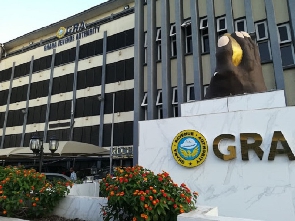 The Ghana Revenue Authority (GRA) is the revenue arm of government
The Ghana Revenue Authority (GRA) is the revenue arm of government
Highly-publicised tax disputes between the Ghana Revenue Authority (GRA) and some multinational firms will not damage the country’s reputation as a coveted investments destination, tax expert Dr. Abdallah Ali-Nakyea has argued.
Rather, if handled well, he said they can bolster investor confidence that the country’s tax administration and laws are working.
The GRA has come under the spotlight lately, after stating that an audit of the South African telecommunication firm MTN revealed that it under-reported its earnings by up to 30 percent over the 2014-2018 period – leading to fines and fees totalling GH¢8.2billion. The case was however withdrawn after MTN communicated its intention to challenge the charge.
Eyebrows were raised further when it emerged shortly afterward that the local arm of petroleum heavyweight Tullow Oil had taken up a case with the GRA at the London-based International Chamber of Commerce over two elements of a recent tax evaluation, which amounted to US$387million plus penalties. Tullow argued that the charges are a violation of its rights under its petroleum agreements. Other companies, including Goldfields and Kosmos Energy, have also cited similar cases.
However, Dr. Ali-Nakyea – who is the Director at Ali-Nakyea and Associates, said tax audits and their disputations are part and parcel of tax administration in any jurisdiction; and despite being high-profile, as long as these incidents are cannot be proven to be targetted witch-hunting of foreign firms, there should be no cause for alarm.
“It is well within the rights of the tax body to confirm or otherwise the operations of an entity vis-à-vis what has been filed as tax returns; and part of this process includes provisions for objections to be raised on any assessment, in addition to dispute resolution procedures. So far, we have not seen an act of general application to a class of companies, especially multinationals. Everyone is subject to an audit and has a right to challenge the results,” he explained in an interview with the B&FT.
“I do not think it is an issue for which investors should be scared or reconsider their positions in the country. I believe strongly that even as some foreign companies are folding-up and leaving, others are hurriedly coming in – which is common with every investment space. Most of those leaving are in trade, which has been altered by the pandemic and technology. That has nothing to do with the GRA. We do not see anything similar with mining and other firms. It would make more sense to resolve whatever disputes exist,” he added.
Reacting to concerns that foreign firms could reconsider their position in the country on the back of the tax disputes, Mr. Ali-Nakyea – also a lecturer at the University of Ghana Business School (UGBS), noted an amicable solution to the matters of contention will firm-up investor confidence that systems and laws within the country are working.
Of great importance, he explains, is the Independent Tax Appeals Board (ITAB) establishment, which he believes will deepen tax administration in the country and engender confidence among taxpayers.
“With inauguration of the board, which is constituted of seasoned professionals across law, accounting and taxation, we now have an added layer of oversight that will look at these objections between taxpayers and the GRA in a more dispassionate manner. If anyone feels they have been treated in a manner that is not impartial, the ITAB is there as well. In any case, this should give investors more confidence that an independent body is there to resolve issues which might be had with the GRA before going to court. Ultimately, some of these issues are simply a matter of interpretation,” he remarked.
He added that it would be erroneous to treat GRA’s withdrawal of a charge for further review as a hurried retreat, explaining that keeping the initial case untouched while a review is ongoing would lead to accumulated interest and penalties against the entity.
“To say that I am going to review an earlier assessment, so it is being withdrawn and I am issuing a discontinuance notice as I address your concerns cannot be considered as back-tracking,” he added.
In 2021, MTN paid taxes and levies amounting to GH¢3.1billion – approximately 40 percent of the GH¢7.7billion it generated in revenue for the year. Last year, the telco said it was on track to fulfil its planned spend of US$1billion on Network Infrastructure and Information Systems (NIIS) by 2025; a pledge it reaffirmed this month.
Tullow, on the other hand, has said it plans to invest US$300million in Ghana during 2023, primarily in the Jubilee Field – with over US$100million of the amount going into infrastructure. The planned expenditure represents an increase of US$50million compared to 2022, and is expected to support production growth through 2025 and free cash flow generation of US$700-800million based on 2P reserves only.
The GRA is ramping up efforts as central government targets raising GH¢112.4billion this year.